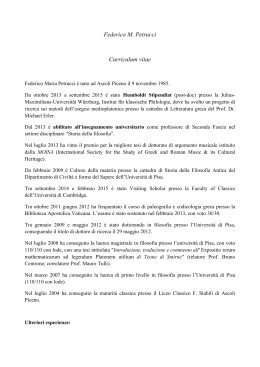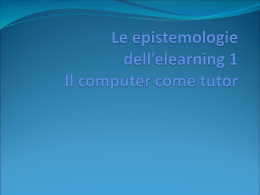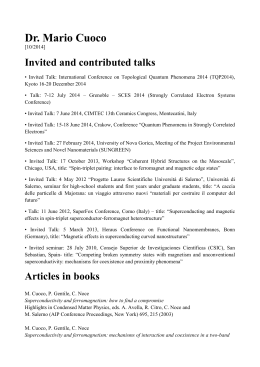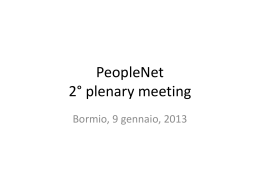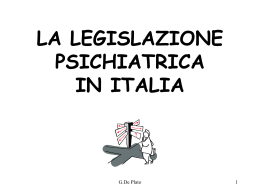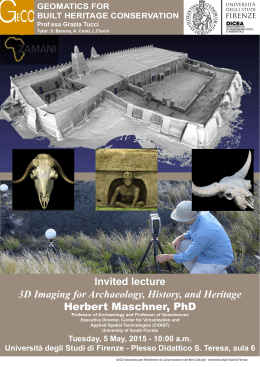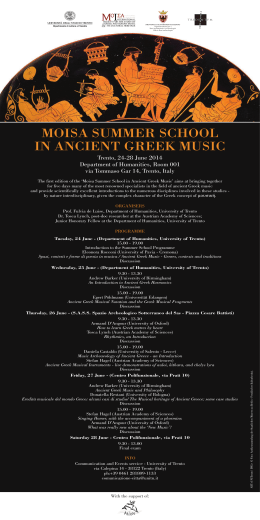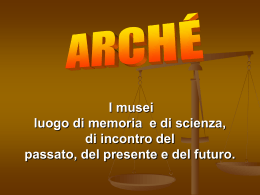Andrea Capra (March 6, 1971) (updated April 2016) CONTACTS Office Address: Università degli Studi di Milano, Via Festa del Perdono 7, 20122 Milano, Italy Email: [email protected] Telephone: + 39 02 50312782 (office) + 39 02 36750097 (home) EDUCATION 1997-2000 PhD in classics, University of Milan 1995 Diploma, Scuola Normale Superiore di Pisa 1995 Laurea (≈ BA + MA) in Greek Literature, University of Pisa, (110/110 cum laude). RESEARCH INTERESTS • Plato’s dialogues • Greek comedy • The Greek novel • Greek Lyric poetry • Reception of archaic epic • Sacred landscapes in Greek literature CURRENT POSITION, TEACHING AND SUPERVISION Current position (2011-present): “Professore aggregato” (≈ assistant professor, permanent position) in Greek Language and Literature, University of Milan Current teaching (2006-2014): Greek Literature, Greek Language, Greek Civilization. Supervision (2006-present): I have been for many years in the PhD board for the classical area and I have supervised two PhD theses and an average of 10 dissertations per year (BA, MA). INDIVIDUAL GRANTS, AWARDS AND FELLOWSHIPS 2016 Princeton Seeger Center for Hellenic Studies Fellowship: Summer 2017 2015 National Academic Qualification as Associate Professor in History of Philosophy 2014 National Academic Qualification as Associate Professor in Classical Philology 2013 National Academic Qualification as Associate Professor in Greek Literature and Language 2013 Istituto Nazionale del Dramma Antico (Syracuse): Translation of Aristophanes' Assemblywomen for the XLIX Greek Theatre Festival (assignment and contract after a selection based on published work) 2011-2012 Harvard Center for Hellenic Studies: Academic year fellowship 2010 Premio Monselice (monetary prize: best 2005-2010 Italian translation from classical theatre: Aristophanes’ Assemblywomen. Cf. below, PUBLICATIONS, Books, n. 2) 2001-2002 Invited visiting scholar at the Faculty of Classics of Cambridge (with a two-year stipend from the University of Milan) 2001 Grant holder as P.I. in a project on the reception of Homer in archaic and classical poetry (Scheme “Giovani ricercatori”, Ministry of Education, Italy). 1996-1999 PhD Grant, University of Milan (salary and full coverage of university fees). 1990-1994 Scuola Normale Superiore, Pisa, university grant (free accommodation, dining rights, full coverage of university fees, additional stipend). PARTICIPATION IN CURRENT RESEARCH PROJECTS 2015-2016 “MOMOS. Strategie della satira antica (Luciano di Samosata e la tradizione della satira)”, (progetto di Ateneo Ca’ Foscari di Venezia, 24 months, under consideration for funding) 2014-2020 “The Classical Tradition in Portuguese, Lusophone and European Literatures and Cultures”, P.I. M. Futre Pinheiro (http://www.clepul.eu/Eng/ViewArea/28) 2014-2017 “Lexicon of Ancient Comedy”, funded by the Italian Ministry for Education 2013-2016 “Transmission of Antiquity: Literary Encoding, Manuscript Tradition, Reception”, funded by the Italian Ministry for Education (“PRIN”, 36 months), P.I. G. Mastromarco (Università degli Studi di Bari) MEMBERSHIPS AND SERVICE TO SECTOR 2014-2015 ICAN (International Conference on the Ancient Novel), member of the advisory board (http://www.uhd.edu/academic/colleges/humanities/ican/board.php) 2014-Present Steering Committee of ACME. Annali della Facoltà di Studi Umanistici dell'Università degli Studi di Milano (http://riviste.unimi.it/index.php/ACME/about/editorialTeam). 2014-Present Scientific board of the new series “Allori Boreali” (Leonida editore, cf. http://www.editriceleonida.com/collane.html) 2013-Present Scientific board of the Forum “Classici Contro” (lettere2.unive.it/flgreca/FCCRedazione.htm) 2012-Present Plato International Society (http://platosociety.org) 2011-Present Editorial Board of Dyonisus ex machina (cf. http://dionysusexmachina.it) 2010-Present Elected Member in the Board of the Milan and Monza AICC (Associazione Italiana di Cultura Classica). OTHER PROFESSIONAL APPOINTMENTS 2013-2015 Professor of Classical languages literature at the TFA school of the University of Milan (TFA is a scheme designed to train future school teachers) 2005-2010 “Ricercatore” in Greek Language and Literature, full-time permanent position 2004-2008 Professor of Greek literature at the “Scuola Interuniversitaria Lombarda di Specializzazione per l'Insegnamento Secondario” (a State-funded, university-related scheme designed to train future school teachers) 2000-2005 High School teacher (9/00-5/02 sabbatical), full-time permanent position, Classical and Italian language and literature 1996-1997 Civilian National Service (Local administration of Modena, education department) 1995-1996 Short-term editing jobs (RCS Editions and Sylvestre Bonnard Editions). RECENT INTERNATIONAL PAPERS (2012-2016) 4/2016 “L’ironia platonica nel Protagora :quando l’azione si fa pensiero”, invited paper at the workshop “Le forme teatrali nella rappresentazione filosofica. Scene platoniche di dialogo sulla virtù”, Università degli Studi di Trento, Tranto, It. 3/2016 “Poetry and Heroism in the Phaedrus”, invited paper at the international workshop on “Plato’s Phaedrus”, The City College of New York (CUNY), New York City NY (US), 2/2016 “KAINOΣ (e affini). Il pubblico e l’originalità della commedia”, invited paper at the conference “Per un lessico della commedia greca”, Milan, IT. 12/2015 “Plato, Republic 487b-89d”, invited paper at the workshop “Reading Group on Plato’s Republic VI”, Norwegian Institute at Athens, Athens, GR. 12/2015 “Poetic Beginnings and Silenic Closures in Plato's Erotic Dialogues”, invited paper at the conference “Framing the Dialogues: How to Read Openings and Closures in Plato”, University of Cyprus, Nicosia, CY. 11/2015 “Mythos and Mimesis from Plato to Aristotle”, Key-note invited paper at the conference “Ways of Imitation”, Florence University, Florence, IT. 10/2015 “Evénos de Paros : un (anti-)modèle pour Platon”, accepted paper at the conference “La vérité. Platon et les sophistes”, Université d’Aix-Marseille, Aix-en-Provence, FR. 10/2015 “Platon et Aristophane ou comment faire jaillir l’utopie du quotidien”, invited paper at the workshop “La fiction politique dans l’antiquité. Platon et Aristophane”, Université de Lorraine, Nancy, FR. 10/2015 “A 19th Century ‘Milesian Tale’: Settembrini’s Neoplatonics”, invited paper at the “International Conference on the Ancient Novel” (ICAN V, “From Tradition to Re-writing the Ancient Novel”), Houston TX, US. 10/2015 “Keeping Emotions in Check: The Explicit Strategies of the Narrator”, accepted paper at the “International Conference on the Ancient Novel” (ICAN V, “From Tradition to Re-writing the Ancient Novel”), Houston TX, US. 04/2015 “Plato’s Possessors of Beauty (Symposium, Phaedrus)”, invited paper at the workshop “Qu’est-ce que le beau? (Homère, Platon, Aristote), Université Catholique de Louvain – Institut Supérieur de Philosophie Centre De Wulf-Mansion, Louvain La Neuve, BE. 02/2015 “Satira e democrazia alla prova: Aristofane e la città”, invited paper at the workshop “Il lessico della politica: dall’antichità a Charlie Hebdo”, Università di Udine e Trieste, Udine, IT. 12/2014 “Platon et la comédie : une apologie fantastique pour la poésie”, invited paper at the workshop “Platon et la littérature”, Université de Lorraine, Nancy, FR. 12/2014 “Cultura e spettacolo: le parole della commedia in viaggio nel tempo”, invited paper (with. M. Giovannelli) at the workshop “La satira del successo. La spettacolarizzazione della cultura nel mondo antico (tra retorica, filosofia, religione, potere e società)”, Università Ca’ Foscari, Venezia, IT. 07/2014 “The Rise of Self-Commentary in Greece: From Built-in Epic Glosses to Plato, Isocrates and the Commentators”, invited paper at the conference “Medieval Self-Commentary: A Transnational Perspective”, Fondation Hardt, Genève, CH. 07/2014 “Plato’s Comic Critique of Comedy and Its Later Influence”, invited paper at the workshop “Plato as Literary Critic”, Center for Advanced Studies at L. Maximilians Universität, München, DE. 04/2014 “La verità tra Socrate e Dioniso”, invited lecture for the event “Classici contro” (University of Venice), Vicenza, IT. 02/2014 “Theatre with No Characters: Aristophanes from Acharnians to Assemblywomen”, invited lecture, University of Silesia, Katowice, PL. 08/2013 “A Star Performer and His People: The Staging of Assemblywomen”, paper accepted, “Popular Comedy Conference”, Glasgow, UK. 07/2013 “Transcoding the Silenus. Aristophanes, Plato and the Invention of Socratic Iconography”, paper accepted, “X Symposium Platonicum: Symposium”, Pisa, IT. 06/2013 “Lyric Poetry and Its Platonic Pedigree”, invited paper at the Conference “Gêneros poéticos na Grécia antiga”, São Paulo, BR. 06/2013 “Musical Dialectics in the Phaedrus”, invited lecture, Universidade de São Paulo, São Paulo, BR. 06/2013 “Plato’s Muses and the Discourse of Philosophy”, invited lecture, Universidade Federal de Minas Gerais, Belo Horizonte, BR. 04/2013 “Musical Socrates: The Phaedo and the Phaedrus”, invited lecture, University of Pennsylvania, Philadelphia PA, US. 04/2013 “Aristotle’s Poetics and the Anatomy of Myth”, invited paper at the Conference “The Poetics in Its Aristotelian Context”, Columbus OH, US. 11/2012 “A Cloak for the Naked. Iambic Mercy in Aristophanes' Assemblywomen (408-421)”, invited paper at the workshop “Word Play. Ancient Greek Drama and the Role of Particles”, Seminär für klassische Philologie, Heidelberg, DE. 10/2012 “The Life of a Strange Poet: Plato and the Biography of Socrates”, invited lecture, Department of Classics Research Seminars, Durham, UK. 06/2012 “Stringing the Story Together. Xenophon and the Case for Consistency”, invited paper at the Kyknos workshop “The literary Ambitions of the ‘Pre-sophistic’ Novels”, University of Wales, Lampeter, UK. 05/2012 “Το πλατωνικό δράµα”, invited lecture for the series “Authors meet critics” (on N. Charalabopoulos' Platonic Drama and Its Ancient Reception, C.U.P 2012), University of Patras, Patras, GR. 04/2012 “Socrates Plays Stesichorus”, Research Symposium, Harvard Center for Hellenic Studies, Washington DC, US. 04/2012 “Pointy-headed Academic? Poetry and Rhetoric in the Phaedrus and the Phaedo”, invited paper at the University of Virginia, Charlottesville VA, US. 02/2012 “Performing Plato: Voices of Love and Poetry in the Lysis”, paper accepted at the conference “History, Philosophy, Tragedy” (proceedings forthcoming), University of Florida, Tampa FL, US. PUBLICATIONS Books 1. Plato's four Muses. The Phaedrus and the Poetics of Philosophy, Washington DC-Cambridge MA 2014. 2. Aristofane, Le donne al parlamento, edizione, traduzione e commento, Roma 2010. 3. Alla fonte delle Muse. Introduzione alla civiltà greca, Torino 2007 (co-authored with F. Conca, G. Lozza, A. Pizzone and G. Zanetto. Authored 5 out of 11 chapters). 4. Momenti della ricezione omerica. La poesia arcaica e il teatro classico, Giornate di studio del dottorato di ricerca in filologia, letteratura e tradizione classica, Milano 9-10 febbraio 2004, coediteed with D. Canavero, A. Sgobbi and G. Zanetto, Milano 2004. 5. Agon Logon. Il Protagora di Platone tra eristica e commedia, Milano 2001. Forthcoming articles and book chapters 1. “Lyric Oblivion: When Sappho Taught Socrates how to Forget”, in P. Ceccarelli, P. - L. Castagnoli, L. (eds.) Greek Memories: Theories and Practices, Cambridge 2017. 2. “A Star Performer and His People: The Staging of Assemblywomen”, in C. Panayotakis - I. Ruffell, Popular Comedy, Cambridge 2017. 3. “‘Total Reception’: Stesichorus as Revenant in Plato's Phaedrus”, in B. Currie I. Rutherford, The Reception of Greek Lyric Poetry 600BC-400AD: Transmission, Canonization, and Paratext, Leiden 2017. 4. “Xenophon's ‘Round Trip’. Geography and Narrative Technique in the Ephesiaka”, in M.P. Futre Pinheiro, D. Konstan, B. Duncun MacQueen (eds.), Cultural Crossroads in the Ancient Novel, Groeningen 2016. 5. “Aristotle’s Poetics and the Anatomy of Tragedy”, in P. Destrée, M. Heath and D. Munteanu (eds.), The Poetics in Its Aristotelian Context, Cambridge 2016. 6. “Transcoding the Silenus. Aristophanes, Plato and the Invention of Socratic Iconography”, in Plato's Symposium. Selected Papers from the Tenth Symposium Platonicum, Sankt Augustin 2016. 7. “Cultura e spettacolo: le parole della commedia in viaggio nel tempo (bomolochos ed elenchos)”, in A. Camerotto – S. Maso, La satira del successo. La spettacolarizzazione della cultura nel mondo antico, Milano 2016. 8. “Rise and Fall of a Parian Shooting Star. New Perspectives on Evenus”, Materiali e Discussioni 75, 2016, forthcoming. 9. “Nuda Veritas in Platone”, in A. Camerotto and F. Pontani, Nuda Veritas, Milano 2016, 123-127. 10. “Aristophanes’ Iconic Socrates”, in F. de Luise, Ch. Moore and A. Stavru (eds.), Brill’s Companion to Socrates and the Socratic Dialogue, Leiden 2016, 68-89. Articles and book chapters 1. “Poesia e non poesia’ nella Festa aristofanesca di Sanguineti”, in F. Condello - A. Rodighiero, «Un compito infinito». Testi classici e traduzioni d’autore nel Novecento italiano, Bologna 2015, 77-93. 2. “Plato’s Cinematic Vision: War as Spectacle in Four Dialogues (Laches, Republic, TimaeusCritias)”, in A. Bakogianni (ed.), War as Spectacle. Ancient and Modern Perspectives on the Display of Armed Conflict, London 2015, 129-138. 3. “Lyric Poetry and Its Platonic Pedigree”, in C. Werner - B.B. Sebastiani (eds.), Gêneros poéticos na Grécia antiga: confluências e fronteiras, São Paulo 2014, 125-148. 4. “Plato’s Ornitheology and Entomythology”, in M.L. Severo Buarque (ed.), Filosofia antigua e literatura, O que nos faz Pensar 34, 2014, 97-107. 5. (with M. Giovannelli): “‘Prince of Painters’. The Grimacing Mask of Power and Seduction in Aristophanes' Assemblywomen”, in S. Knippsschild - M. Garcia Morcillo (eds.), Seduction and Power: Antiquity in the Visual and Performing Arts, London-New-York 2013, 95-107. 6. “Dalla carta al teatro: nota del traduttore di Le Donne al Parlamento di Aristofane (Inda, Siracusa 2013)”, Engramma 107, 2013, http://www.engramma.it/eOS2/index.php?id_articolo=1386. 7. “La bimba senza bambola e l'enigma bizantino dell'otre. (Aristofane, Tesmoforiazuse 689ss. e Appendix Graeca 7.57 Cougny)” in C. Lambrugo - C. Torre (eds.), Il gioco e i giochi nel mondo antico tra cultura materiale e immateriale, Bari 2013, 83-91. 8. “… Sed magis amica Voluptas: le lettere ‘platoniche’ di Aristeneto” (1.3 e 1.18), in O. Vox (ed.), Studi sull’epistolografia letteraria greca di età imperiale e tardoantica, Alcifrone, Eliano, Filostrato, Aristeneto, Teofilatto Simocatta, Lecce 2013, 375-386. 9. “Detour en route in the Aegean sea? Xenophon of Ephesus 5.10.2”, Classical Philology 107, 2012, 70-74. 10. “Socrates Plays Stesichorus”, Center for Hellenic Studies Research Bulletin, online 9/5/2012. 11. “‘Why Plato Wrote’: The Insularity of Platonic Studies”, Center for Hellenic Studies Research Bulletin, online 14/2/2012. 12. “Tradurre Aristofane”, in G. Peron (ed.), Premio Città di Monselice per la traduzione letteraria e scientifica, 38-40, Padova 2012, 335-35. 13. “Socrate tra pubblico e privato”, in A. Camerotto - F. Pontani (ed.), Classici Contro, Milano 2012, 97-106. 14. “Con l'occhio oltre l'ostacolo: la filologia è un'arte ‘fantastica’? Le Donne al parlamento alla luce di un allestimento moderno”, Dionysus ex Machina 2, 2011, 428-439. 15. (with S. Martinelli Tempesta): “Riding from Elea to Athens (via Syracuse). The Parmenides and the Early Reception of Eleatism: Epicharmus, Cratinus and Plato”, Methexis 24, 2011, 153-193. 16. “Teatro e libertà. Mimesi, stupore e straniamento fra Brecht e Platone”, in A. Costazza (ed.), La filosofia a teatro, Milano 2010, 113-131. 17. “Plato’s Hesiod and the Will of Zeus. Philosophical Rhapsody in the Timaeus and the Critias”, in G.R. Boys-Stones - J. Haubold (eds.), Plato and Hesiod, Oxford 2010, 200-218. 18. “Lyric Poetry”, in G.R. Boys-Stones, B. Graziosi, P. Vasunia (eds.), Oxford Handbook of Hellenic Studies, Oxford 2009, 454-468. 19. “‘The (Un)happy Romance of Curleo and Liliet’. Xenophon of Ephesus, the Cyropaedia and the Birth of the ‘Anti-tragic’ Novel”, Ancient Narrative 7, 2008, 29-50. 20. “Dove Odisseo smarrì la via di casa. Angeli, naufragi e favolose tempeste a Capo Malea”, in G. Cavajoni et al. (eds.), Debita dona. Studi in onore di Isabella Gualandri, Napoli 2008, 71-101. 21. “L'efebo divino e l'incarnato della bella. Due note al testo di Senofonte Efesio (1.2.8 e 5.12.3)”, ACME 61, 2008, I, 277-282. 22. “Quasimodo e i Lirici Greci”, in. C. Dognini - A. Capra - G. Chiari - G. Manzoli - E. Rigotti - G. Nuvoli, La vitalità dei classici. Da Quasimodo a Pasolini, Milano 2008, pp. 11-39. 23. “Il Sofista di Platone e l’ombra del filosofo”, in OT/ORBIS TERTIUS: Ricerche sull'immaginario contemporaneo, Milano 2008, 39-46. 24. “Stratagemmi comici da Aristofane a Platone. I: Il satiro ironico (Simposio, Nuvole e altro)”, Stratagemmi 2, 2007, 7-48. 25. “Stratagemmi comici da Aristofane a Platone. II: L'invettiva (Cavalieri, Gorgia, Repubblica)”, Stratagemmi 3, 2007, 7-45. 26. “Stratagemmi comici da Aristofane a Platone. III: L'utopia (Repubblica, Donne al parlamento)”, Stratagemmi 4, 2007, 7-50. 27. “Dialettica e poesia: Platone e il ‘mesmerismo’ di Socrate”, in A. Costazza (ed.), La poesia filosofica, Milano, 2007, 29-44. 28. “Il flutto dell’Idaspe (Nonno, Dion. XXIV 43)”, Paideia 61, 2006, 69-71. 29. “Protagoras’ Achilles: Homeric Allusion as a Satirical Weapon (Plato, Protagoras 340a)”, Classical Philology 100, 2005, 274-277. 30. “Bacchilide 3.85-90 (πολιὸν παρ[έν]τα γῆρας)”, Eikasmos 15, 2004, 43-46. 31. “Poeti, eristi e innamorati: il Liside nel suo contesto”, in F. Trabattoni (ed.), Platone, Liside, II, Milano, 173-231. 32. “Simonide e le corone di Omero”, in D. Canavero - A. Capra - A. Sgobbi - G. Zanetto (eds.), Momenti della ricezione omerica. La poesia arcaica e il teatro classico, Milano 2004, 101-126. 33. (with M. Bonazzi) “Callicle e Serse: democrazia e tirannide nel Gorgia”, in S. Simonetta (ed.), Potere sovrano: simboli, limiti, abusi, Bologna 2003, 217-233. 34. “Dialoghi narrati e dialoghi drammatici in Platone”, in M. Bonazzi – F. Trabattoni (eds.), Platone e la tradizione platonica, Milano 2003, 3-30. 35. “La data di composizione del Liside”, in F. Trabattoni (ed.), Platone, Liside I, Milano 2003, 122-132. 36. (with V. Gilardi), “4 note alla Pitica IX di Pindaro (5-25; 87-92)”, ACME 55, 2002, 125-132. 37. “‘Addio, Achille’ (Simon. fr. 11 W.2 13-21)”, Eikasmos 12, 2001, 43-54. 38. “Il lamento della donna insigne (Anacr. 72 G./2=347 PMG 11-18)”, Lexis 19, 2001, 147-152. 39. “Il mito delle cicale e il motivo della bellezza sensibile nel Fedro”, Maia 52, 2000, 225-247. 40. “La fine di Protagora e lo statuto letterario dei dialoghi socratici”, ACME 53, 2000, 19-37. 41. “L'epinicio III di Bacchilide”, Studi Classici e Orientali 47, 1999, 159-174. 42. “Il Menesseno di Platone e la commedia antica”, ACME 51, I, 1998, 183-192. 43. “La tecnica di misurazione del Protagora”, Annali della Scuola Normale Superiore di Pisa, Classe di Lettere e Filosofia, 2, I, 1997, 273-327. 44. (with M. Curti), “Semidei simonidei. Note sull'elegia di Simonide per la battaglia di Platea”, Zeitschrift für Papyrologie und Epigraphik 107, 1995, 27-32. Reviews 1. A.K. Cotton, Platonic Dialogue and the Education of the Reader, Hermathena, forthcoming. 2. S. Beta, Enigmi oracoli e sogni nella cultura antica, Turin 2015, Il Manifesto, 2016. 3. M. Bettini, Il grande racconto dei miti classici, Turin 2015, Il Manifesto, 2015. 4. M. Heath, Ancient Philosophical Poetics, Cambridge 2013, Classical Review 64, 2014, 29-30. 5. P. Ryan (ed.), Plato’s Phaedrus. A Commentary for Greek Readers, introduction by M.L. Gill, Norman 2013, Bryn Mawr Classical Review 2013. 6. (with M. Treu and M. Giovannelli): “Aristofane senza filtro” (on the production of Aristophanes’ Clouds by the Teatro Stabile dell'Umbria), Stratagemmi 13, 2010, 249-262. 7. F. Conti Bizzarro, Comici entomologi, Alessandria 2009, Bryn Mawr Classical Review 2010. 8. C. Capuccino, Filosofi e Rapsodi. Testo, traduzione e commento dello Ione platonico, Bologna 2005, Bryn Mawr Classical Review 2007. 9. F.M. Giuliano, Studi di letteratura greca, Pisa 2004, Eikasmos 17, 2006, 514-525. 10. D. Sedley, Plato’s Cratylus, Cambridge 2003, Journal of Hellenic Studies 124, 2004, 216-217. 11. R. Blondell, The Play of Character in Plato’s Dialogues, Cambridge 2002, Rivista di storia della filosofia 59, 2004, 823-827. 12. R. Weiss, Plato in the Cave, Oxford 2001, Journal of Hellenic Studies 123 (2003), 256-257. Translations 1. Sogno sull’onda, Italian translation of Papadiamantis’ Ὄνειρο στὸ κῦµα, in A. Kolonia (ed.), Papadiamantis, Racconti, Milan, forthcoming. 2. Le Donne al Parlamento di Aristofane. Tradotto per il XLIX ciclo di rappresentazioni classiche al teatro greco di Siracusa (Libretto for the audience, with a foreword by the translator), Syracuse 2013. 3. Platone, Protagora, traduzione e commento per le scuole, Scandicci (Firenze) 2003. 4. K. McLeish, Aristotele, Firenze 1999, transl. by. A. Capra (Aristotle, London 1998). 5. D.F. McKenzie, Bibliografia e sociologia dei testi, Milano 1998, transl. by A. Capra - I. Amaduzzi, (Bibliography and the Sociology of Texts: The Panizzi Lectures 1985, London 1986).
Scaricare

